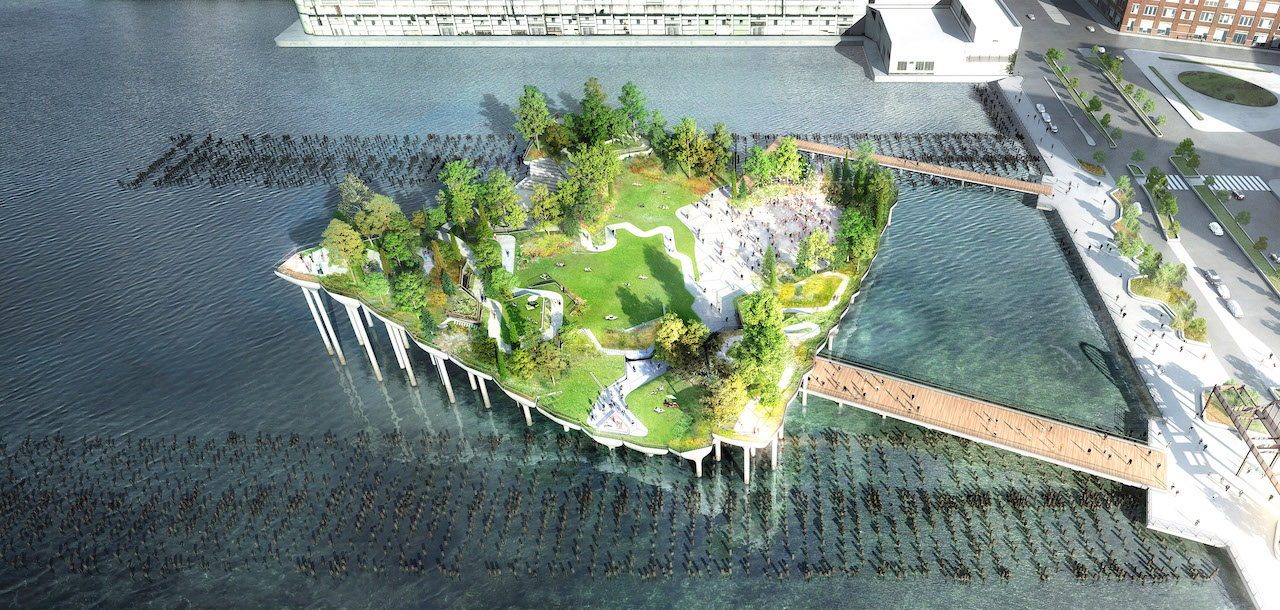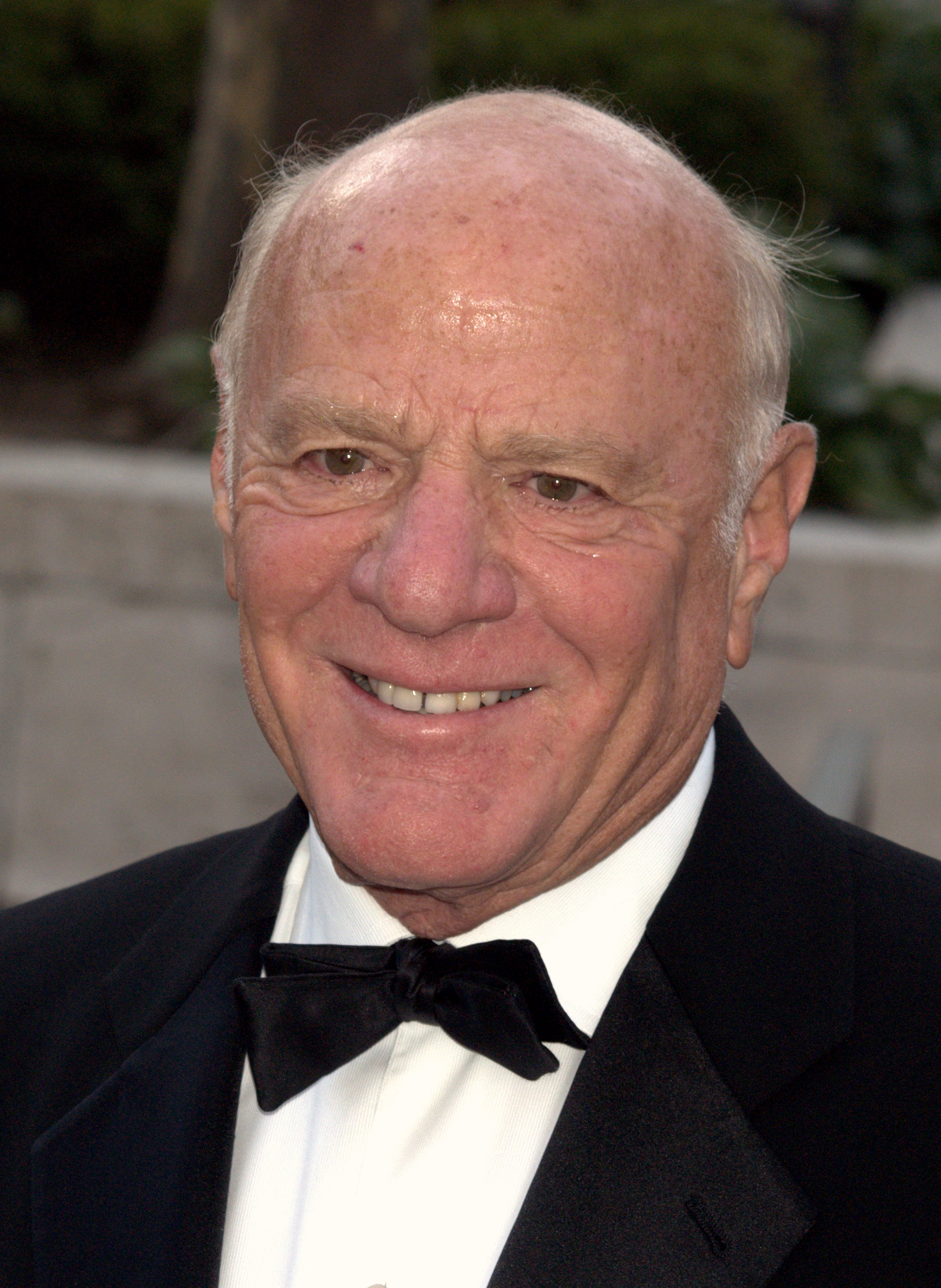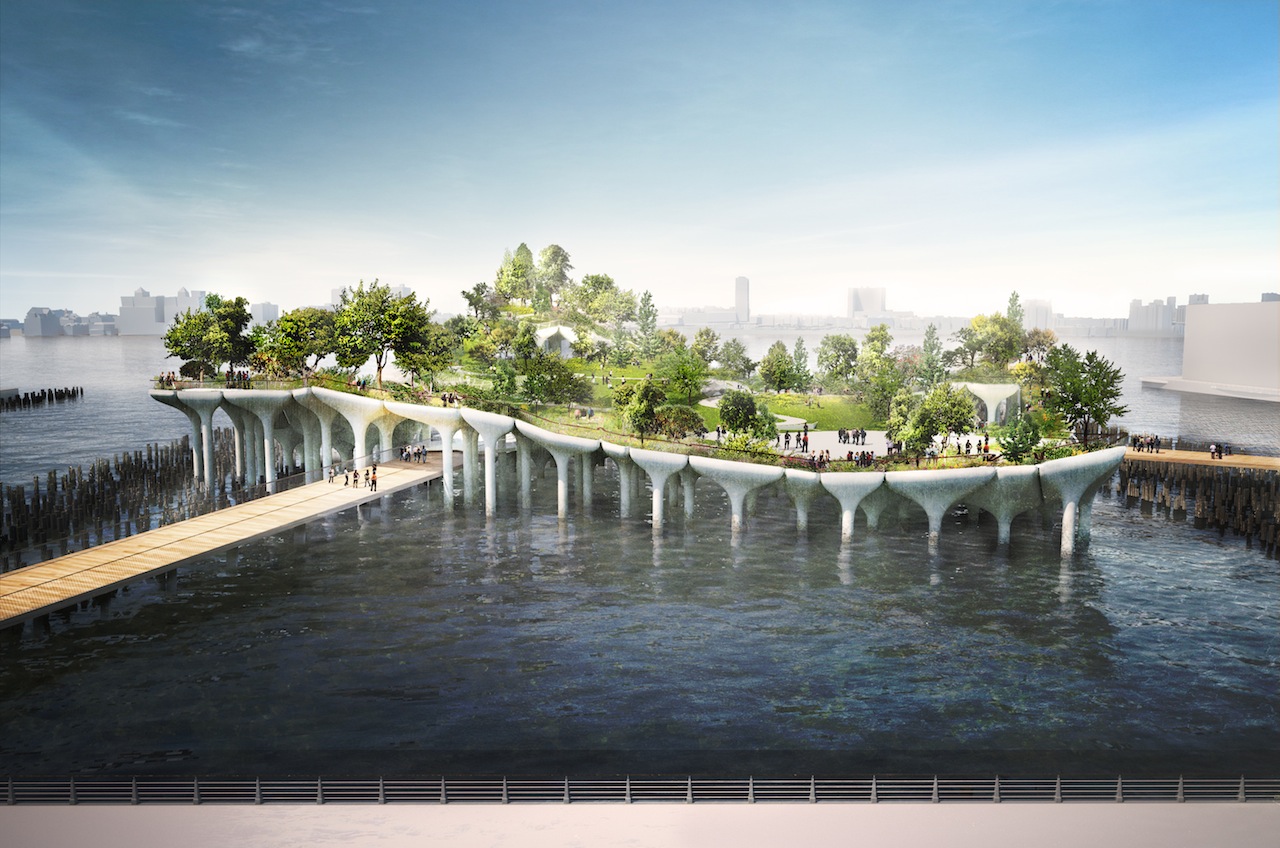
BY LINCOLN ANDERSON | Oh, well…that was fast!
After hearing arguments in court last week, it only took two days for an Appellate Division court to rule on the lawsuit against Barry Diller’s Pier55 project.
Last Thursday, the judicial panel upheld a lower court’s ruling on the suit — filed by the City Club of New York — in the process, lifting an injunction that had prevented further pounding of piles for the new pier.
However, Tom Fox and Rob Buchanan, the two City Club members in the suit, told The Villager that they would seek to appeal the decision — all the way up to the state’s high court — the Court of Appeals.
The lawsuit against the Pier55 project resumed Tues., Sept. 6, in stately Appellate Division court, on E. 25th St. just east of Madison Square Park. Though the proceedings lasted less than half an hour, the courtroom was packed with high-powered personages eager to see the outcome go their way. Media mogul Diller — who with his wife, fashion icon Diane von Furstenberg — has pledged to donate $113 million toward the $130 million project, was seated right in the front row.
The power couple’s gift, pledged through their family foundation, is one of the largest donations ever given to a park.
Earlier this summer, the Appellate Division issued an injunction against the Pier55 project, pending its hearing of the petitioners’ appeal. But the court subsequently partially lifted the injunction to allow the project’s first nine piles — out of more than 500 total that would be needed for the pier — to be driven. Not allowing that small number of piles to be installed would have set back construction of the entertainment “fantasy island” a full year.
Last Thursday, the Appellate Division ruled that the Hudson River Park Trust’s entering into a contract with PIER55, Inc. — the Diller-led nonprofit that would operate the pier and its extensive entertainment programing— did not violate the “public trust doctrine.”
Under the doctrine, the state Legislature is required to approve the commercial use of parks or the removal of parks from public use. However, the court’s decision noted, “There is no case law in New York applying the public trust doctrine to state, as opposed to municipal, parkland.”
The court also found that the Trust — the 5-mile-long waterfront park’s governing city-state authority — took “a hard look” at Pier55’s anticipated environmental impacts, and gave a “reasoned elaboration” as to why, according to the Trust, the pier would not have a negative impact on its surroundings.
The lawsuit argued that the environmental assessment statement, or E.A.S., was not sufficient, and that instead a more-extensive environmental impact statement, or E.I.S., was required. The judges disagreed.
In addition, the Appellate panel stated that the petitioners “lack standing to object to the Trust’s failure to issue any bid prospectus…with respect to the Pier55 lease…since they never alleged that…they had the wherewithal to submit a plausible competing bid, or that…they would have done so.”
The Hudson River Park Act of 1998, the park’s founding legislation, requires such projects to be put out to bid. However, the judges said that, even without a formal prospectus for the project having been issued, the petitioners, in fact, “had sufficient information to make a bid.”
Also, that Pier55 was built on an entirely new footprint — north of the former Pier 54 — did not invalidate the project, either, in the judges’ view.
“The 2013 amendment…referring to a ‘reconstruction’ or ‘redesign’ of Pier 54 outside of its historic footprint, makes clear that the Legislature was authorizing an entirely new, redesigned structure,” the judges opined.
The petitioners argued unsuccessfully that state lawmakers — when they voted on an amendment to the Hudson River Park Act three years ago authorizing the widening of Pier 54 — naturally assumed the pier would be rebuilt in the same spot — not relocated to the north.

In addition, David Paget, the Trust’s environmental attorney, poured water on the critics’ accusation that Diller stands to reap huge profits from retaining the lucrative rights to the video and audio of any performances on Pier55.
“That is scurrilous,” Paget told The Villager. “He said he will not realize a single dollar from this donation.”
Paget also noted that while the former Pier 54 could hold up to 5,000 people for events, Pier55’s maximum capacity will only be 3,200. But the opponents argue there will be a lot more events over the year — to which Paget responded, that’s irrelevant under the law, in terms of how the project’s environmental impact is measured.
Pier55 project supporters trumpeted the latest verdict — while also blasting the City Club petitioners for daring to challenge the high-profile scheme.
“Today’s decision shines a light on this small group of detractors and their shameful campaign, which served only to squander precious resources that could have been put to better use to improve the park,” chided Mike Novogratz, chairperson of Friends of Hudson River Park Trust, the park’s main private fundraising group.
Madelyn Wils, the Trust’s president and C.E.O., similarly slammed the suit.
“This was a ridiculous lawsuit from the start,” she scoffed, “so we’re pleased by today’s swift and sweeping decision. Today’s ruling marks a victory for the millions of people who love Hudson River Park, and we look forward to welcoming visitors to what will be one of New York’s greatest public spaces.”
A Pier55 spokesperson said, “We are grateful for the court’s decision and are pleased to be back on our fall construction schedule, which will make Pier55 a reality for all New Yorkers.”
Governor Andrew Cuomo, an early supporter of the project, also cheered the ruling — adding that the park will also provide “economic benefits.”
“I applaud the…court’s decision to allow the Hudson River Park Trust to move forward on the long-awaited project to transform Pier55 into a dynamic, vibrant public space all New Yorkers can enjoy,” Cuomo said. “This ruling affirms that Hudson River Park Trust and PIER55, Inc. appropriately assessed the environmental impacts of the project and conducted a timely, thorough review. I look forward to seeing construction move forward, and realizing both the economic and recreational benefits this vital park will bring.”
However, the City Club’s Fox and Buchanan said the fight is not over.

A longtime waterfront park activist, Fox formerly headed the Hudson River Park Conservancy, the Trust’s predecessor agency. Buchanan is a boating enthusiast who relishes rowing Whitehall boats — traditional Hudson River craft — in the waters of the Lower West Side park. He contends that Pier55 would obstruct people from rowing in that particular “embayment” of the park.
Following Thursday’s decision, Fox issued an impassioned statement to The Villager.
“Thirty years ago,” he said, “when I played a leadership role in creating both the Hudson River Park and the Hudson River Park Trust, I believed in the strength of environmental regulations, the integrity of the public trust doctrine and the importance of public participation in planning and oversight.
“It’s very hard to accept that the current leadership of the Trust could deceive the state Legislature, manipulate the public review process, and short-circuit environmental regulations to allow a billionaire to build his own vanity project that increases the value of his adjacent corporate headquarters, in the middle of a mapped estuarine sanctuary.”
(Diller’s IAC Building, evocative of white sails — which he commissioned famed architect Frank Gehry to design — is located on the Chelsea waterfront at W. 18th St., a few blocks north of the planned pier.)
“It’s a sad day for the Hudson, the park and the integrity of the environmental laws that were established to protect both,” Fox said. “Today was their victory. They should enjoy it while they can.”
Fox said the City Club indeed would seek a hearing before the Court of Appeals — which can decide whether or not to take the case.
For his part, Buchanan said their lawsuit is about preserving the park’s integrity.
“We sued because the project is an egregious example of what can happen when ‘public-private partnerships’ run amok,” he stated. “The river isn’t real estate, and the spaces in between piers aren’t development envelopes. I think it’s safe to say we’re going to appeal.”
In addition, the City Club is currently also fighting the so-called “Diller Island” on at least two other fronts. It has filed suit in federal court against the U.S. Army Corps of Engineers permit for Pier55, and also in New York State Supreme Court against the state Department of Environmental Conservation permit for the project.

















